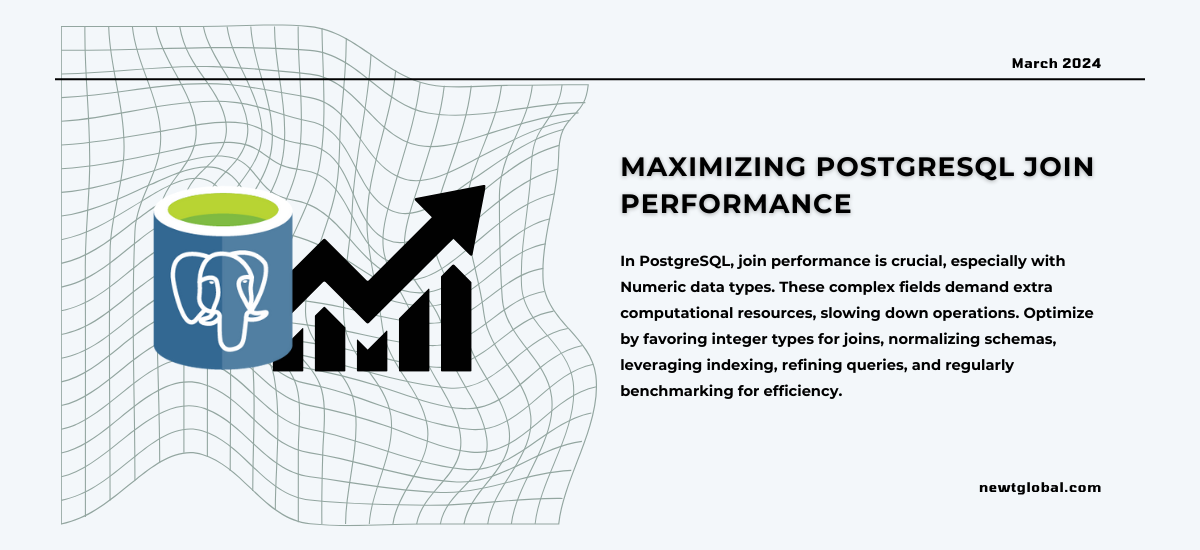
When working with databases and making them run faster, choosing the right kind of data to use is very important, especially when linking tables together. PostgreSQL is a popular database system because it’s flexible and strong, and it has many different kinds of data you can use for different needs. However, not all data types are equally good when linking tables together.
In this simple guide, we’re going to talk about how linking tables works in PostgreSQL databases, and we’ll pay special attention to how numbers are handled. We’ll look at why using numbers in certain ways can slow things down, and we’ll share tips and tricks on how to make things run smoother.
Understanding Numeric Data in PostgreSQL
Numeric data in PostgreSQL is good at handling numbers with very precise details. It’s useful when we need to do complex math or deal with very exact numbers. But, this flexibility also means it can slow things down, especially when we’re joining data.
Numeric data brings complexity to the database structure. It needs more computer power to handle its varying precision and size. When PostgreSQL works with joins involving Numeric data, it has to do more complex calculations compared to simpler number types like integers. This complexity can slow down joining, especially with large amounts of data or complex joining conditions.
Digging Deeper into How Numeric Data Affects Joining Performance
When we use Numeric data in joins, PostgreSQL has to do extra work compared to simpler numbers like integers. Because Numeric values can vary a lot in precision and size, PostgreSQL has to work harder to make sure things match up right. This extra work can slow down joining, especially with lots of data or complicated joining rules.
To make your database run faster when linking tables, especially with numbers, here are some smart strategies:
-
- Use Whole Numbers for Linking: Whenever possible, use whole numbers (like int or bigint) for table links, especially for key columns. Whole numbers are easier and faster for the database to deal with than detailed decimal numbers.
- Keep Your Database Simple: Try to simplify your database layout to avoid linking tables with numbers. Break your data into smaller parts and link those parts in simpler ways. This can help avoid the need for complex links that slow things down.
- Indexing: Use indexes on your data to speed up linking. Create indexes for columns that you often link on, even if they have to be numbers. Indexes help the database find and link data faster.
- Optimize Your SQL Queries: Make sure your SQL queries (the instructions you give the database) are as simple as they can be. Avoid unnecessary calculations or complex conditions that make the database work harder than it needs to.
- Monitor and Test: Keep an eye on how fast your database is running, especially when linking tables. Test different ways of organizing and accessing your data to find what works best. Tools built into PostgreSQL can help you see where slowdowns are happening and how to fix them.
By following these tips, database managers and developers can make their PostgreSQL databases run more efficiently, especially when working with numbers in linked tables.
Elevate Your PostgreSQL Performance to New Heights.
Uncover the secrets to optimizing join performance, even amidst the complexities of Numeric data types. Embrace our expert strategies to harness the full power of PostgreSQL, from intelligent data type selection to advanced indexing and query refinement. Whether you’re a seasoned database administrator or a developer keen on efficiency, we provide the insights and tools you need to ensure seamless, high-speed operations.
To learn more about optimizing PostgreSQL databases and enhancing your database performance, visit Newt Global at newtglobal.com. For inquiries and consultations regarding database optimization, email us at marketing@newtglobalcorp.com.
Newt Global DMAP is a world-class product enabling mass migration of Oracle DB to cloud-native PostgreSQL faster, better, and cheaper. Take action today to unlock the full potential of your database infrastructure!
